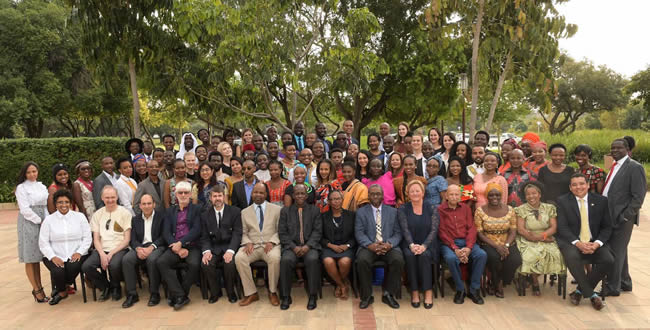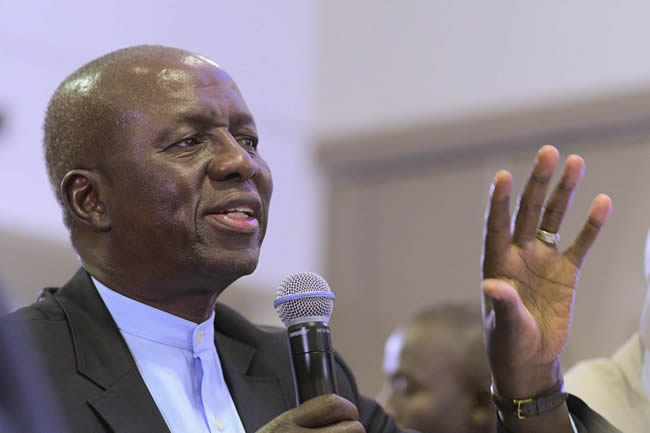“It is not about power, it is about purpose.” In his Keynote Address at the Second Oliver Tambo Centenary Lecture, Justice Dikgang Moseneke pre-empted Oliver Tambo’s response to the current leadership challenges that the African continent is facing.
Through his activism over the decades, lawyer, revolutionary and politician, Oliver Reginald Tambo left an indelible impression on South Africa and its new Constitution. In celebration of his legacy, the Centre for Human Rights, Faculty of Law, University of Pretoria together with the Oliver & Adelaide Tambo Foundation, hosted the second in a series of Oliver Tambo Centenary Lectures and the welcoming ceremony for the students of the Centre’s four Master’s programmes on Thursday 30 March 2017. The students that were welcomed at the event are studying towards the following degrees: LLM/MPhil in Human Rights and Democratisation in Africa (HRDA), LLM in International Trade and Investment Law in Africa (TILA), LLM/MPhil in Multidisciplinary Human Rights (Multi) and LLM/MPhil in Sexual and Reproductive Rights in Africa (SRRA).
![]() Click here to download this Press Statement
Click here to download this Press Statement
The event brought together the donors of the Master’s programmes (representative of the European Union, Norwegian Embassy, DAAD / German Embassy, Dutch Embassy, ABSA, National Research Foundation and the General Representation of the Government of Flanders), students, academics and members of civil society to pay homage to Tambo’s life and in the process inspire the young women and men on the Master’s programmes. Former Mayor of Ekhuruleni, Duma Nkosi – who played an instrumental role in the official renaming of Johannesburg International Airport in Tambo’s honour – was also present.
A moment of silence was observed in memory of Ahmed Kathrada, a veteran of the South African liberation struggle, former political prisoner, anti-apartheid activist and politician. Kathrada spent 26 years in jail – 18 of which was on Robben Island – after being convicted and sentenced to life imprisonment, with hard labour, alongside Nelson Mandela, Denis Goldberg, Andrew Mlangeni, Walter Sisulu, Govan Mbeki, Raymond Mhlaba and Elias Motsoaledi during the Rivonia Treason trial.
Guests were welcomed by Professor André Boraine, the Dean of the Faculty of Law at the University of Pretoria.
Ms Linda Vilakazi, CEO of the Oliver & Adelaide Tambo Foundation spoke about the collaboration with the Centre to celebrate the 'gentle giant' and the need to emulate Oliver Tambo's principles to keep his legacy alive.
The Norwegian Ambassador to South Africa, Ms Trine Skymoen, spoke on behalf of the donors of the Master’s programmes. She recognised Tambo’s extraordinary leadership and moral character during the dark days of apartheid in South Africa. She acknowledged the human rights work that has been done and still needs to be done in Africa and encouraged the 2017 Master’s degree students to be inspired by those who had come before them but to also make their own mark.
On behalf of the Alumni Association, Ms Abena Danso (Head of Legal Division and Company Secretary of Sandoz South Africa and alumna from the TILA Class of 2014), shared the extraordinary journey she had as a student and the unique opportunity to interact with people from all over Africa. She concluded by lauding the life-changing nature of the course.
The Assistant Director of the Centre for Human Rights, Mr Norman Taku, introduced the 80 Master's degree students from 27 African countries, Switzerland and Reunion Island, with anecdotes from each country.
Professor Tinyiko Maluleke, Advisor to the Vice-Chancellor and Principal recognised how the University of Pretoria is transforming rapidly and introduced the Keynote Speaker Justice Dikgang Moseneke.
Presenting the lecture, the Retired Deputy Chief Justice of South Africa, Justice Moseneke, gave the Second Oliver Tambo Centenary Lecture and the Welcoming Address to the Master’s students. Justice Moseneke first acknowledged the dignitaries including former First Llady, Graça Machel and the Tambo family.
“He stands out as one of the leading revolutionary leaders of his time, and indeed of our time” said Justice Moseneke. Justice Moseneke underscored Tambo’s selflessness by sacrificing three decades of his life to serve the liberation movement without ever demanding to become ‘Number One’. He became the inspiration for domestic uprising in the 1980s and Justice Moseneke recounted his first meeting with Tambo: "My dad went to Chancellor House to seek legal support.”
He paid his respects to the early resistance leaders on the African continent and the formation of the African Union (AU) and the adoption of the African Charter on Human and Peoples’ Rights (African Charter). He went on further to dismiss the notion that “fundamental human rights are a post-colonial, or neo-colonial fetish.” On the South African Constitution, he stated: “Our Constitution is designed to move us from a murky past, to an inclusive future. It is based on the will of the people, reconciliation and diversity. The Constitution is premised on the will of the people and not only establishes the supremacy of the Constitution, rule of law and fundamental freedoms, but contains collective conditions.”
Justice Moseneke emphasised that ethical leadership is indeed indispensable. Ethical leadership is not about the elite but should focus on the creating equal, open, non-racial, non-sexist, socially just societies. He advised that “we must continue to nurture ways for fresh and inspired leaders from our continent. We must continue to say to young people that freedom is the life blood of full life. No one can thrive in captivity.” He acknowledged that people on the ground are best placed to reject impunity and encouraged the young lawyers to fight the fight in African capitals and villages, and to guard the freedom once earned, jealously.

Group photo of the students that were welcomed at the second Oliver Tambo Centenary Lecture


